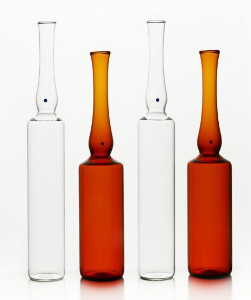How Many Times Can A Glass Ampoule be Used?
Glass ampoules, those small sealed containers used in various fields like pharmaceuticals, cosmetics, and laboratories, often go unnoticed in our daily lives. However, these tiny vessels play a significant role in preserving the purity and efficacy of their contents. In this article, we'll delve into the world of glass ampoules, exploring their uses, advantages, and the intriguing question: How many times can a glass ampoule be used?

Point 1: The Basics of Glass Ampoules
Glass ampoules are small, hermetically sealed vials used to contain and preserve liquids, particularly substances that are sensitive to air and contaminants. They are typically made from borosilicate glass, known for its high thermal resistance and chemical inertness.
Point 2: Pharmaceutical Applications
In the pharmaceutical industry, glass ampoules are indispensable. They are used to store and dispense medications, vaccines, and sterile solutions. The hermetic seal ensures that the contents remain uncontaminated, extending the shelf life of critical drugs.
Point 3: Cosmetic Uses
Glass ampoules are also prevalent in the cosmetics industry. High-value serums, essences, and beauty elixirs are often packaged in these small vials. The sealed environment keeps the product fresh until the moment it's applied to the skin, enhancing its efficacy.
Point 4: Laboratory and Scientific Research
Laboratories worldwide rely on glass ampoules for the safe storage and distribution of chemicals, reagents, and reference materials. The sealed design ensures that the integrity of the substances is maintained, reducing the risk of contamination.
Point 5: Advantages of Glass Ampoules
a. Hermetic Seal: The airtight seal of a glass ampoule provides an excellent barrier against contaminants, ensuring the purity and stability of the contents.
b. Protection from Light: Glass ampoules are often amber-colored, protecting light-sensitive substances from degradation due to UV rays.
c. Long Shelf Life: The sealed environment extends the shelf life of the stored substances, reducing waste and cost.
d. Precise Dosage: Ampoules typically contain a single, precise dosage, eliminating the need for measurement and reducing the risk of dosing errors.
Point 6: Single-Use Nature
The primary drawback of glass ampoules is their single-use nature. Once opened, an ampoule cannot be resealed. This limitation stems from the need to maintain sterility and purity. Reusing an opened ampoule would risk contamination and compromise the integrity of the contents.
Point 7: Sustainability Considerations
While glass is recyclable, the single-use nature of ampoules does raise sustainability concerns. Manufacturers are exploring ways to reduce the environmental impact by optimizing ampoule design and recycling options.
Point 8: Alternative Packaging
In situations where multiple uses are required, alternative packaging options like vials with rubber stoppers or screw caps are favored. These allow for repeated access while still maintaining a high degree of sterility.
Point 9: Conclusion
In conclusion, glass ampoules are remarkable vessels that play a pivotal role in preserving the integrity of sensitive substances in various industries. Their hermetic seal, protection from light, and precise dosing make them invaluable. However, it's essential to remember that glass ampoules are designed for single use to maintain sterility and purity. The question, "How many times can a glass ampoule be used?" is thus answered with "only once."
- 0


